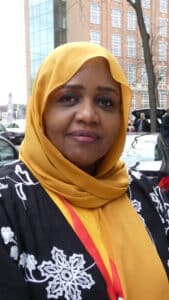Political instability, violent conflict and an economic crisis have left 15 million people in Sudan in urgent need of emergency aid. With the Sudan Joint Response, a collaboration of NGOs united in the Dutch Relief Alliance are working on future-proof solutions to the complex crises in the country. As one of the speakers at the European Humanitarian Forum 2023, Plan International’s Eiman Ibrahim explains how this works in Sudan.
The current situation in Sudan is complex and unstable. After the popular protests in 2019 that deposed the ruler, there seemed to be room for improvement in Sudan. But the desired elections for a democratically elected government did not materialise. A military coup took place in October 2021. Sudan’s politics, economy and security took a huge hit, at a time of worrying food shortages. All these factors created a huge need for emergency aid, and complicated the work of humanitarian organisations in the country. Cooperation between the various humanitarian organisations working in Sudan is of great importance.
 Eiman Ibrahim, Plan International country coordinator of de Sudan Joint Response
Eiman Ibrahim, Plan International country coordinator of de Sudan Joint Response
“The unstable political situation in Sudan makes it more difficult for humanitarian organisations to relieve pressure on the population, which has been hugely affected by the collapse of the economy. The political crisis has led to an economic crisis and skyrocketing inflation,” says Eiman Ibrahim, who works from Plan International as the Sudan Joint Response coordinator.
Tensions rise
There are now 15 million people in Sudan in need of emergency assistance, and the number is growing daily. “People who have been displaced, as well as the communities that shelter them, urgently need help to meet their basic needs. Food, water, education, healthcare, it is all in short supply, especially in the more remote areas. Because the situation is so dire, conflicts between different population groups also arise more quickly. A small problem can quickly escalate because everyone is very tense. The climate crisis is also exacerbating the situation.”
Major risks for girls and young women
Girls in particular, and with increased poverty and the increased risk of violence against women and girls, many girls have to drop out of school, “The poor economic situation of the families played negative role for the deterioration of girls education status as parents are no longer able to pay school fees, or if at all they do they choose to pay school fees only for boys. Painfully enough the girl child is forcibly married to a well to do man and the dowry money is used to pay school fees for the boy child,” Ibrahim says.
Sudan Joint Response
Within the Sudan Joint Response, more than one million people in Sudan are provided with emergency assistance. “The programme is unique because it allows for an immediate response to crisis situations, but also because emergency aid is combined with support to empower the population. In doing so, we map out exactly where our help is most needed and what we can contribute. We do this together with our partners in the Dutch Relief Alliance and with partners in Sudan. Our cooperation with local partners is very important because they know exactly what is going on and can therefore also provide sustainable long-term solutions.” The localisation process is the best and most efficient way to provide immediate emergency relief with a long-term view.
Uncertain future
But there is still a long way to go. “The situation is uncertain and changing by the day,” concludes Ibrahim. “Therefore, it is hugely important that we keep fighting to continue improving the lives of young people and girls in particular. We continue to strengthen cooperation between humanitarian organisations and rely on the expertise of local partners.”
Photo: Sari Omer and Else Lenselink, Plan International
Save the Children
Laan van Nieuw Oost-Indië 131-k
2593 BM Den Haag
The Netherlands
Chair organisation: Plan International
E: office@dutchrelief.org